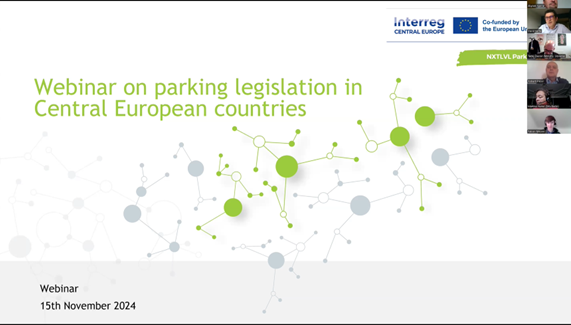Exploring Parking Legislation in Central Europe: NXTLVL Parking Project Webinar
On November 15, 2024, the NXTLVL Parking Interreg CE project hosted an engaging webinar focusing on parking legislation across Central European countries. This event brought together experts, legislators, and urban mobility enthusiasts to discuss how effective parking policies can shape greener and more sustainable urban transport systems.
Key Highlights from the Webinar
The session began with a presentation by David Bárta from CityONE, who introduced the NXTLVL Parking project and shared insights from the project’s comprehensive survey on parking legislation. This survey provided a foundation for understanding current practices and identifying areas for improvement across partner cities.
Tadej Žaucer, Head of the Transport Policy Division at the Slovenian Ministry of the Environment, Climate, and Energy, delved into Slovenia’s Action on Parking Policy Implementation. These activities include integrating parking policies with spatial and transport planning, measures such as setting up parking pricing strategies, creating P+R systems, and developing a national parking platform. An exciting feature highlighted was the use of cutting-edge tools like ANPR (Automatic Number Plate Recognition) systems to support data-driven policy decisions.
Fabian Meurer from Kompetenznetz Klima Mobil in Baden-Württemberg, Germany, shared the region’s innovative Park.Raum.Dialog initiative. This participatory approach involves municipalities, citizens, and stakeholders to create strategic parking management policies. The initiative has successfully reduced uncertainties around implementing parking fees and provided tailored recommendations for municipalities, driving progress toward climate-friendly urban transport planning.
A Collaborative Discussion
Following the presentations, the speakers engaged in a dynamic discussion with participants, addressing questions about harmonizing parking policies with broader urban mobility goals. Attendees appreciated the opportunity to exchange ideas and learn about practical tools and methodologies that could be applied in their local contexts.
Conclusion
The webinar exemplified the NXTLVL Parking project’s commitment to fostering collaboration and knowledge exchange to develop more effective and sustainable parking management practices. By aligning parking policies with climate and urban mobility strategies, the project continues to push for greener and more livable cities.
